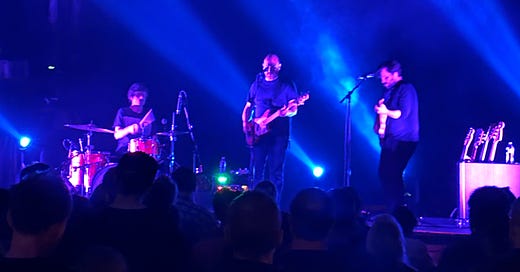This past Saturday I had the opportunity to go see Pedro the Lion perform in Chicago. On this tour, Bazan and the band are performing the albums Control and It’s Hard to Find a Friend in their entirety. Both albums are at least 20 years old, and a lot has changed in the time since Bazan wrote them.
What I love about David Bazan as an artist is he acknowledges change, and in response, he changes his art.
On most tours, Bazan takes questions between songs. He will begin a dialogue with his audience. He does this at living room shows and in traditional venues. On this tour, given that his set list is almost 2 dozen songs, he amended that practice and only had one break about halfway through the set.
During that break, he acknowledged that he wrote these songs when he was 21 & 22 and 25 & 26 (for IHTFAF & Control, respectively) and that he was young and hadn’t learned about misogyny and other prejudices within his outlook and music. He had learned since then. He gave the crowd permission to take whatever breaks they needed for themselves if they needed it, and if folks didn’t understand why he was saying this, well, that this announcement wasn’t for them.
He played his songs, and he accepted them as part of his story. But Bazan has also found other ways to accept himself, by making changes to his lyrics over time.
Take the song “The Fleecing” from 2004’s Achilles Heel. In this song, the original bridge has the lyrics:
I could buy you a drink, I could tell you all about it, I could tell you why I doubt it, and why I still believe it, Why I need it, And what the Pharisees don’t see
When he re-recorded the album years later with the Passenger String Quartet, he used new words:
I could buy you a drink, I could tell you all about it, I could tell you why I doubt it, And why I don’t believe it, And why I grieved it pretty hard, How I was blind but now I see.
On Saturday, he made another change to his lyrics.
On the track “The Bells,” the original chorus features a conversation between a father and son, or more likely, a believer and their god.
Dad, I broke my promise to you, If you’re wondering where I’ve been. I thought I knew what I was doing, But I was wrong again. I understand, son. I understand, son. I understand.
On Saturday, Bazan sang the song like this:
Self, I broke my promise to you, If you’re wondering where I’ve been. I thought I knew what I was doing, But I was wrong again. I understand, Self. I understand, Self. I understand.
With those subtle but significant changes, Bazan finds a way for his work to grow with him. These are not the revisionist changes of George Lucas’ re-edits of the original Star Wars trilogy. These are the hard-fought realizations of someone whose worldview has shifted.
Bazan has always been an artist ahead of so many of us. Before there was anything like the exvangelical and deconstruction pockets of the internet, there were artists like him. And I will always be grateful for anyone who makes art that helps free others.
In the epilogue of The Sandman comic, Dream says “I have no liking of prisons, Master Li. Sometimes I suspect that we build our traps ourselves, then we back into them, pretending amazement the while. That this is the way of life, from the All-Highest down to the meanest creature in creation.”
I am glad that Bazan does not let his past define his present, and that his present does not ignore his past. I am glad that with the passage of time, the past can change from the prison bars that confine us, and can be melted down into the keys that set us free.we
(Programming note: I will be on vacation the remainder of this week.)





